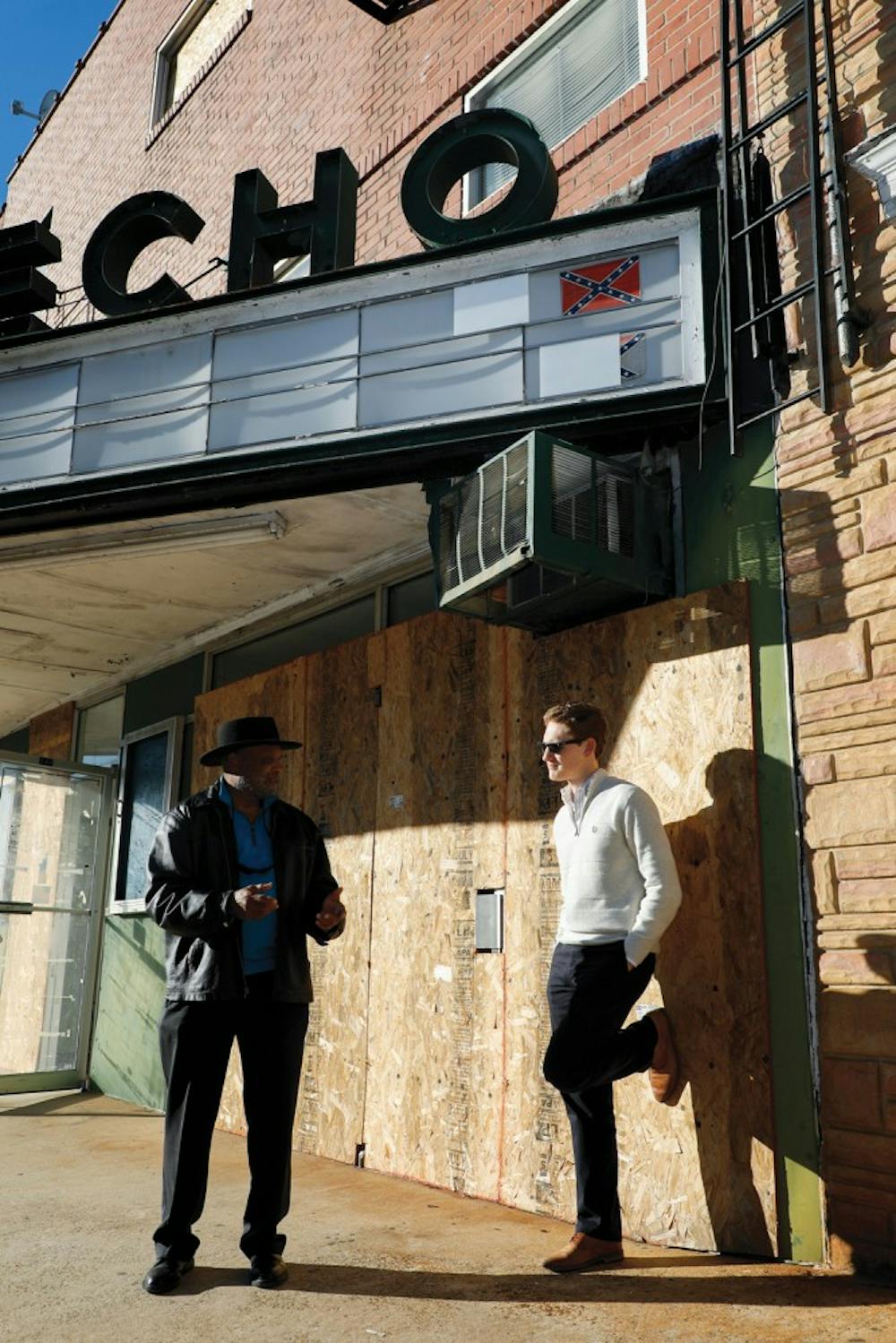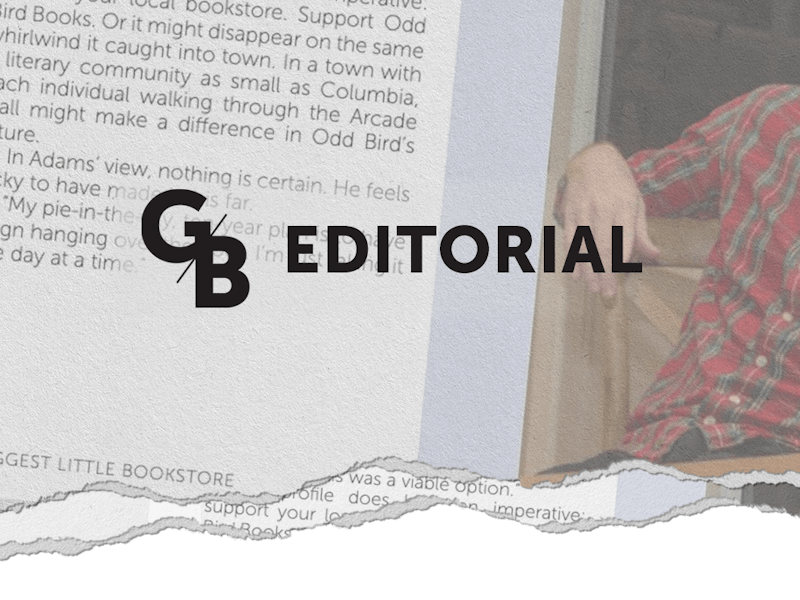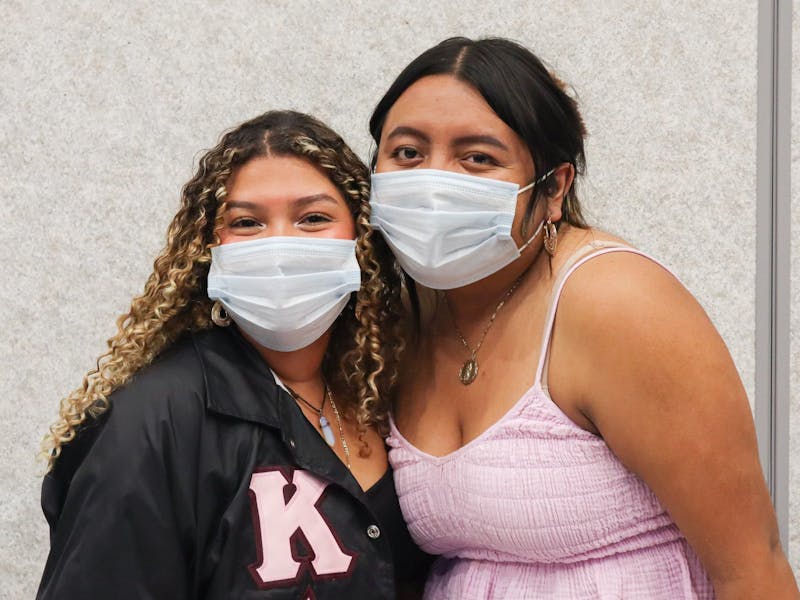Outside of the old Echo Theater in downtown Laurens, South Carolina – just an hour away from Columbia – Reverend David Kennedy points to the balcony above the marquee.
“That’s where they tried to assassinate me,” he said.
The "they” in this statement refers to the former building owners – John Howard and Michael Burden. Both Burden and Howard were proud Grand Dragons of the KKK in South Carolina (the equivalent to a state leader) and owners of “The Redneck Shop.” Howard and Burden often butted heads with the African American Reverend when he led Civil Rights protests – including one against this very shop. Within a few years and after several plot twists stranger than fiction, Rev. Kennedy became the owner of the building that housed The Redneck Shop.
The Echo Theater has led many lives. In its original state, the Echo Theater was a segregated movie theater. African Americans had to enter in the side door and sit exclusively in the balcony. When the deed of the building got into the hands of Howard and Burden, it became what was known as “The Redneck Shop.” The storefront sold Confederate memorabilia, neo-Nazi paraphernalia, Klan robes and hoods, and many other run-of-the-mill racist novelties. During this time – 1996 to 2013 – the theater also served as a meeting space for the KKK, the Aryan Nation’s World Congress, and the headquarters for the 2008 presidential campaign for neo-Nazi John Taylor Bowles. This space was also home to the – self-boasted – ”nation’s only KKK museum.”
“They had t-shirts that said, ‘This is the way you pound n*****s,’ that had a little white boy urinating on a little Black boy. It was horrific,” Rev. Kennedy said. “The Klan robes – they had it all out.”
The store was a fixture in this small town of Laurens for almost two decades. White hoods stood on display in the front of the store, and orders for local Klan robes were tacked on the walls. Even in the current desolation of the building, robe orders remain on the walls and Klan membership cards litter the ground.
Right now, the building is home to nothing other than broken glass and remnants of racism.
The store was not by any means the only measure of racism in the town. In order for such an institution to stay afloat, it generally takes the complicit action and silence from the rest of the community. The town itself is the namesake of a famous slave trader of the 18th century, John Laurens. Until 1985, a noose hung on one of the big oak trees in town, a constant scare tactic and reminder of the place Black people held in their society. Rev. Kennedy’s great-great uncle, Richard Puckett, was the last man lynched from this very rope.
“And so we think old people created that myth that if you take that rope down, then the ghost of Richard Puckett is gonna come and hunt you,” Rev. Kennedy said. “I think they created that story to keep our young Black people from having the courage to take the rope down.”
Rev. Kennedy was born and raised in the segregated projects of Laurens and grew up to become the reverend of New Beginning Missionary Baptist Church. He was involved in Civil Rights activism and protests for as long as he can remember, a cause requiring ample bravery and sacrifice. Many folks in the town who support the cause are too afraid to protest in fear of what would happen to them. Today Rev. Kennedy is the president of the Laurens County NAACP. The parallels between him and Martin Luther King Jr. are almost too easy to draw – but a worthy comparison.
“I’ve been arrested several times, all the time innocent. But I guess I wasn’t born to bow down,” Rev. Kennedy said.
So when The Redneck Shop opened in 1996, there was some opposition from civil rights leaders such as Rev. Kennedy, but there were also a lot of people who did not question it, or who shopped at the store for Confederate paraphernalia.
In a 2012 New York Times article, two frequent shoppers at the store were quoted saying, “It’s not like we want a mask or a hood or anything. It’s a Confederate, Southern thing.”
“We just country,” said the other shopper.
However, the theater’s future shifted when one of the building owners, Michael Burden, met and married a woman named Judy Harbeson, who encouraged him to leave the Klan. According to a 1997 article from the Washington Post, Burden left the Klan as a “wedding present” to his wife, who shared concerns about the Klan’s anti-Native American sentiments (she herself was part Native American).
As Burden announced his departure from the Klan, Howard promptly evicted Burden from the apartment he lived in above the shop.
The Reverend said, “So what happened on this day – this particular day – I was on my way to the police department ... and by this time, Michael Burden was in the truck with his family, and he said, ‘Reverend Kennedy, I know you don’t trust me ... But my wife about to starve and my young ones, they about to starve, and the law, the FBI, the SLED, the local law – none of them want to give us any food. We have nothing. Can you help me please?’
I said, ‘Well, if you need food, if you serious, when I come back out of here I’ll make sure all of you have food.’ And what happened, when the wife and children raised their bodies from off that truck – it was horrific. And they had all this debris all over their flesh. And a white police officer said, ‘Reverend Kennedy, don’t help them. They make our town look bad.’ And I said, ‘Sir, our town has been looking bad a long time. It's named after a 18th century slave-trader. Don’t blame that on these young people.’”
When Rev. Kennedy left the police station, Burden was still there with his family. Rev. Kennedy made arrangements for the Burdens to stay in a nearby hotel for a week and organized a big meal to hold the family over until the church soup kitchen opened the next day. Burden and his family stuck around the church for some time as they regained their footing.
“So they start hanging around us daily, and we kept assisting the best we could daily. We didn’t have much to offer, but we had a little clothing ... and they kept hanging around. And we kept talking, and kept talking, and kept talking, and I kept learning, learning, learning,” Rev. Kennedy said. “Because of it, everything was happening to the church in the negative – dead cats, snakes, rats, knocking all the windows out, putting swastikas, Nazi-like things on my door, Confederate flags on my door ... and threats, receiving hate mail ... it was a tough period. But we managed to get through that part ... And we kept working with them, and working with them, and we fell in love with all of them.”
At this point, Burden was both needing cash to regain his footing while wanting to show Rev. Kennedy his appreciation. Thus, he sold the deed to the Echo Theater building to the Reverend for $1,000. The Echo Theater – and The Redneck Shop and KKK Museum within it – were now in his possession.
And right around this time, Judy also guilted Michael into sharing a startling confession with Rev. Kennedy.
“‘He said, ‘You’ve been real good to us,’ and I said ‘Don’t thank me, thank God and this congregation,’ and he said, ‘I had planned to assassinate you.’ I asked him when, he gave me two times and I remember I was at both of those places.” Rev. Kennedy said, “The first place, he saw two of them young white kids coming around me ... and we had a nice little time, nice little chat at this convenient moment. And so I think too many of them got around when he was gonna shoot me and kill me the first time.
And so [the second] night, that was another night, he was in the balcony part of it. And he said, ‘I was gonna shoot you that night. I saw you up there.’ But John Howard told him, ‘If you do it here, they’ll know we did it.
"[Burden] said, ‘you were a pain in his rowdy a**, and he wanted me to do something about you.’ He gave him guns, ammunition.”
Rev. Kennedy’s response was immediate love and forgiveness.
“And I hugged him and told him, ‘Hey, we have other things to do now. We gon’ focus on what we have to do. So you can get set up in life. So you can take care of your family,’” Rev. Kennedy said. “And I told him, ‘I love you, man. I love Judy, I love them children. And I think they know I love them.’”
Yet things still weren’t quite happily ever after.
Burden fell back into trouble after the Reverend helped him get on his feet. Shortly after, he was arrested for breaking and entering.
“Well, he got in trouble after he left us, because I don’t think he knew how to live without John Howard. He took him young ... he preyed on young people. Especially young males,” Rev. Kennedy said.
Rev. Kennedy had been told by Burden and other folks in the community of the way Howard treated Burden and other vulnerable young white men. He took them in, indoctrinated them with the ideals of the Klan, and instilled fear and dependency in them so they wouldn’t be able to separate themselves from Howard.
“'He used to put [Burden] on the railroad track ... and just shoot at him. Not to kill him, but to instill fear in him. He never would pay him money for his labor. But he would pay him by giving him a shirt, a pair of pants, socks and shoes, because he didn’t want him to get away from him,'” Rev. Kennedy said as he recounted what a woman in town told him.
Rev. Kennedy remained and still remains in touch with Burden throughout the trials and tribulations of their lives.
However, although Rev. Kennedy owned the building at this point, he wasn’t able to close down the shop just yet. The deed Burden handed over to Rev. Kennedy came with a stipulation that Howard had to be allowed to run the shop until he died. This put the Reverend in gridlock until 2012, when he won a long, drawn-out legal battle.
In May 2012, Rev. Kennedy was finally able to evict Howard and close the shop. Howard passed away in 2017.
Flash forward to 2019: the Echo Theater is still in a state of deconstruction and transition. Rev. Kennedy has dreams of turning it into a diversity center – a space where he can hold important dialogues and space for healing for the town – but first needs fundraising and repair.
Enter Regan Freeman: a December 2019 University of South Carolina graduate and an aspiring lawyer. He saw the Reverend’s story on the news, and was awestruck. He cold-called the Reverend at his church to see if they could meet, and the rest is history. Freeman has been his sidekick ever since, helping to spread the word about this project and accompanying him on trips to New York City for interviews on the Today Show. Their current hope is that folks will bear witness to their story, and volunteer their time or money if they so desire.
As for the Reverend – real life happily-ever-afters are hard to come by, and near impossible when challenging a centuries-old institution like racism. But the Reverend has no plans to back down.
“It’s a life most people would never understand, because the truth has never been taught in the public school system, and it never will,” Rev. Kennedy said. “I weep with the horrors of the past ... but I pledge, as I live, I will die no man’s n****. I die a man.”


